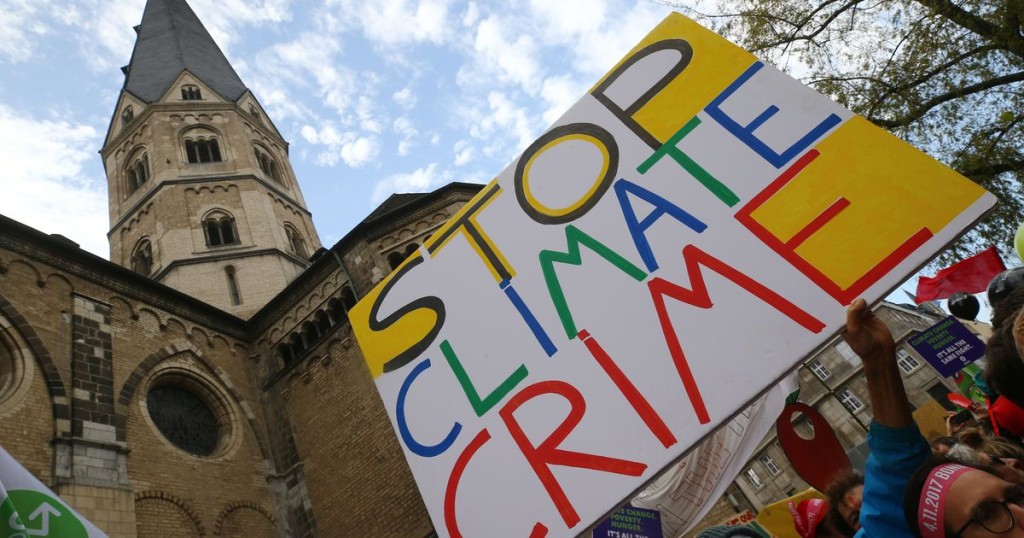Bonn, 9 Nov (Meena Raman) — Developed countries opposed the inclusion of an agenda item dealing with implementing pre-2020 actions onto the agenda of the 23rd meeting of the Conference of Parties to the UNFCCC (COP 23) taking place in Bonn, Germany.On behalf of the Fijian Presidency of COP 23, Morocco’s Foreign Minister, Salaheddine Mezouar, who was COP 22 President, convened informal consultations among Parties on Nov. 8 to consider a proposal by the Like Minded Developing Countries (LMDC) to include pre-2020 actions onto the COP 23 agenda.
The LMDC, had proposed the inclusion of the agenda item which called for more ambitious and accelerated climate action to be taken in the pre-2020 period and was entitled “Accelerating the implementation of the pre-2020 commitments and actions and increasing the pre-2020 ambition in accordance with paragraphs 3 and 4 of decision 1/CP.19”.
(Decision 1/CP.19 refers to decisions taken in Warsaw in 2013. At the COP 23 opening on Monday, 6 Nov. the COP 23 President, Fijian Prime Minister, Frank Bainimarama, said that there was no consensus to include the proposal in the agenda, and had asked the COP22 President to convene informal consultations on the issue with Parties to consider the matter. See TWN Update 2 for more on this.)
(The pre-2020 period refers to existing obligations under the Convention and the Kyoto Protocol, while the post-2020 time frame refers to the obligations under the Paris Agreement.)
Several developing country delegations spoke to Third World Network (TWN) on what transpired at the informal consultations, expressing their outrage and frustration at the stance of developed countries that included the United States (US), the European Union (EU), Canada, Japan, Australia and Norway, despite strong and impassioned pleas by all developing country groupings and several individual countries to developed countries to agree to the pre-2020 agenda inclusion and plug the existing pre-2020 emissions gap caused by their lack of ambition and to honour their existing commitments.
According to sources, while expressing consensus that pre-2020 actions are important, developed countries objected to the inclusion of the agenda item, giving the excuse that pre-2020 issues were already being discussed under several other agenda items and the issue did not need any more dedicated space in the negotiations.
This was their countered by strong retorts from several developing countries including the African Group, India and China who pointed out with examples on how the other existing agenda items did not address the matters at hand and there was need for developed countries to accelerate and raise their ambition in reducing the emissions gap in the pre-2020 timeframe and to not shift the burden onto developing countries in the post-2020 timeframe under the Paris Agreement (PA).
They appealed for urgent action, given the serious devastation and climate impacts faced recently by many developing countries, especially the small-island states.
The US it seems said that while there was consensus on the importance of the pre-2020 actions, it did not see the need for this specific item on the agenda as Parties already had an overloaded agenda and there was no point in adding on more items, adding that the pre-2020 issues had been taken up for quite some time.
According to sources, the EU said that while it was clear that all Parties have to act to address the ambition gap, it did not think that having the agenda item would reduce one single tonne of emissions or add any additional finance, which added to the frustration of developing countries.
Negotiators also told TWN that there were some very strong statements and appeals by developing countries which included Ecuador on behalf of G77 and China, South Africa for the African Group, Saudi Arabia for the Arab Group, Venezuela for the ALBA, Colombia for the AILAC, India, China, St. Lucia, Brazil, Nicaragua, Dominica, Pakistan, Egypt, Malaysia, Cuba and El Salvador.
Sources revealed that Ecuador, speaking for the G77 and China, stressed that the issue of pre-2020 actions was of utmost importance for developing countries to drive action in the post-2020 period and that in the agenda of the work of the COP, there was not enough recognition accorded to the topic. It also reminded the COP22 President that during the closure of last COP in Marrakech in 2016, the COP President had left a clear signal that pre-2020 would be addressed in detail in the following sessions and that is the reason why the proposal must be accorded due attention.
In response to developed countries, according to sources, India highlighted that the Warsaw decision (1/CP.19) had not been complied with and the LMDC wanted to fix timelines to realize the decision. To arguments that the issue was already under discussion under different agenda items, it cited a few examples to show that work was far from being undertaken in those agenda items.
It gave the example of an agenda item relating to the ratification of the Doha Amendment to the Kyoto Protocol (KP) (for giving effect to the second commitment period for emissions reductions by Annex 1 Parties for the period 2013 to 2020) where it said that the agenda was only about providing a status update of the ratification and nothing more.
India had stressed that the Doha Amendment had not come into force and asked when this would happen. It also raised the issue of the revisit mechanism, where developed countries had agreed to revisit their emission reduction targets and raise their ambition if the conditions for doing so were satisfied.
(Many developed countries, had made conditional pledges where they promised to raise their emission reduction targets in the pre-2020 timeframe upon the conclusion of what is now the Paris Agreement.)
India said that Parties had taken several decisions which were not fully implemented and given the short time left to close the pre-2020 gap, there was an urgent need to act urgently and complete the process.
India also pointed to the irony that the PA came into force within 11 months of the Agreement being adopted by Parties and asked why this was not the case with the Doha Amendment of the KP. It questioned if developed countries were “waiting for the post-2020 period to arrive so that the pre-2020 period can be buried.”
Sources revealed that many developing countries also emphasized that the un-fulfillment of past decisions will not inspire confidence and trust that future decisions will be honoured.
Powerful and impassioned interventions were also made by several small island states such as St. Lucia who underscored how the world had witnessed some of the worst weather events in the recent past said that when Parties offer commitments to act, they must act on them and not erode what has been agreed to and appealed for urgent action so that more lives and livelihoods are not lost. It called for specific focus on the pre-2020 action agenda.
Echoing the views of other developing countries, China wanted to see clear timelines on pre-2020 actions, including on when the Doha Amendment would come into effect. According to sources, it also spoke to the increasing gap in ambition, and urged developed countries to re-examine and revisit their pre-2020 targets. Instead of developed countries raising their mitigation targets, some countries have even re-adjusted their commitments downwards, said China.
South Africa for the Africa Group said that no initiatives outside the purview of the States could be a substitute for formal Party engagement to close the pre-2020 gap. Responding to developed countries who said that actions were being taken, it said that despite this, the emissions gap remained and this needs to be closed urgently. It said that a space was needed for discussing how this will be done and asked Parties not to beat around the bush and instead called on them to revisit the past decisions taken to assess whether they had been fulfilled or not.
Saudi Arabia for the Arab Group underscored that pre-2020 actions were the foundation for post-2020 actions and addressing the pre-2020 gap was a matter of trust.
Brazil was reported to have said that said that it found it “incomprehensible” as to why any Party should resist having the pre-2020 item in the agenda of the COP. It also asked if all the talk of post 2020 ambition was also mere lip service.
Malaysia also asked that if Parties do not honour their legally binding commitments in the pre-2020 timeframe, what can be expected in relation to any commitments in a post-2020 world.
Nicaragua pointed to several studies that showed the increasing impacts of climate change and said that the refusal by developed countries to include the pre-2020 agenda item would result in the news headline not being that the agenda item had been dropped but that pre-2020 action had been dropped from the consideration of Parties along with the science.
Sources said that after the exchange, the COP22 President asked Parties to informally meet each other and seek ways to move forward on the matter and informed Parties that he will continue with the informal consultations. – Third World Network




